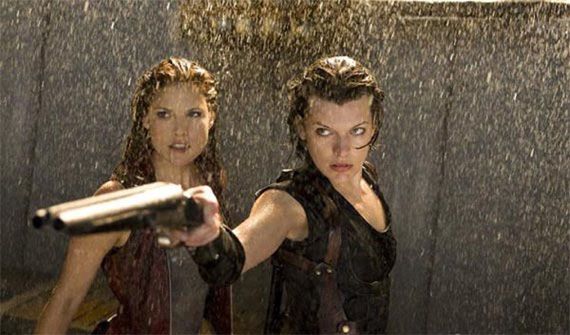Resident Evil: Afterlife director Paul W.S. Anderson spoke to the L.A. Times at some length about his belief in 3D as the future of cinema. Some of what he discussed will sound familiar to anyone who attended the trailer's word premier at Wondercon or the panel that occurred the following day.
As the story goes, Anderson saw an advanced screening of Avatar footage and promptly freaked out with geeky love and appreciation, and expressed an interest to Cameron in using the technology. He recognized in the footage that this version of 3D was neither gimmick nor passing fad, but a way to elevate audience immersion as an art form. As he explains to the Times, though, there are differences between his and Cameron's approach.
Well, it's not really James Cameron's camera. We shot the movie with a Sony F35 camera, which in my opinion is the best digital camera in the world with the best image quality. But Cameron and Vincent Pace had built that camera into a 3-D rig, and that was the rig that we used: the Fusion Camera system, which is the same system that Cameron had used on "Avatar."
Anderson goes on to relate the process of turning a movie shot in 2D into '3D' as being akin to colorizing a black and white film, or dubbing over a silent film to make it a talkie. Anderson says "originating images in the 3-D system is completely different than doing a dimensionalization process in post-production" - a la the recent action blockbuster Clash of the Titans which, while doing excellent business, has been reviewed far more favorably in its 2D form than 3D.
As for the Resident Evil franchise, it's now in its fourth installment and continuing the storyline set down in the first three films - a rarity within the genre, where typically by the third film a franchise has been rebooted or abandoned. Anderson relates the versatility of the RE video games as being influential on the versatility of the films - though the movies have so far had very little to do with the games.
At Wondercon, in fact, the announcements that the new movie will address the storyline of Claire and Chris and feature several game-villains heretofore absent from the films were met with a good deal of enthusiasm. However, Afterlife will remain firmly rooted in the separate mythology set up by the previous three movies.
The Resident Evil video game franchise is very long-lasting and it's been very successful over a long period of time, whereas a lot of other franchises have kind of floundered -- for example, the Tomb Raider... franchise. And one of the things that I think Resident Evil does well as a video game franchise is that they're constantly reinventing themselves...introducing new stories, new characters and new locations.
Following this model, the Resident Evil movies have gone from the claustrophobic world of an underground lab, to Vegas, to a wide open expanse of desert, and with the fourth movie, Alice's adventures go global. It will be interesting to see whether or not the new locations and technology invigorate a franchise that seems to have a fanbase that outweighs its detractors, most of whom cite the movie franchise's complete departure from the story of the games as its primary failing.
Personally, I'm still impressed that this is movie number four, with the same cast and everything.
Anderson also confirms plans to bring Resident Evil: Afterlife to the big SDCC come July - so look for more footage and info then. For more info, be sure to read the L.A. Times article.
Source: L.A. Times

